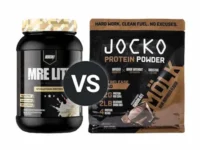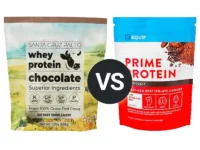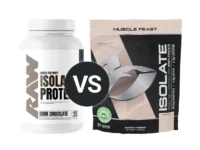Knowledge BaseYou're Questions Answered
What are the best sources of low carb protein powder?
Low-carb protein powders are a popular choice for individuals looking to increase their protein intake without consuming excess carbohydrates. These protein powders are beneficial for those following low-carb or ketogenic diets, as well as for anyone aiming to manage their carbohydrate intake. Below, we explore some of the best sources of low-carb protein powders, including both animal-based and plant-based options.
Best Sources of Low-Carb Protein Powder
Whey Protein Isolate
Whey protein isolate is a highly refined form of whey protein that contains minimal carbohydrates and fats. It is derived from the whey fraction of milk during the cheese-making process and is known for its rapid absorption and high biological value. Whey protein isolate typically contains over 90% protein by weight, making it an excellent choice for those looking to maximize protein intake while minimizing carbs. A study published in the Journal of the International Society of Sports Nutrition found that whey protein isolate consumption after resistance training significantly increased muscle protein synthesis in young men1.
Casein Protein
Casein protein, another milk-derived protein, is known for its slow digestion rate, which provides a sustained release of amino acids. This slow-digesting nature makes casein ideal for consumption before bed or between meals. Casein protein powders are generally low in carbohydrates, with most of the calories coming from protein. A study in the Journal of the International Society of Sports Nutrition found that casein protein consumption before sleep enhanced muscle protein synthesis in resistance-trained men2.
Egg Protein
Egg protein powder is made from egg whites and is a complete protein, containing all essential amino acids. It is low in carbohydrates and fats, making it an excellent choice for those on low-carb diets. Egg protein is also highly digestible and has a high biological value. Research published in the Journal of the American College of Nutrition demonstrated that egg protein consumption post-exercise effectively stimulated muscle protein synthesis in healthy young men3.
Pea Protein
Pea protein is a plant-based protein powder made from yellow split peas. It is low in carbohydrates and a good source of essential amino acids, particularly branched-chain amino acids (BCAAs). Pea protein is a suitable option for those who are lactose intolerant or prefer plant-based supplements. A study in the Journal of the International Society of Sports Nutrition showed that pea protein is as effective as whey protein in promoting muscle growth and recovery, making it a valuable low-carb option4.
Hemp Protein
Hemp protein is another plant-based option that is low in carbohydrates. It is derived from hemp seeds and is rich in essential fatty acids, fiber, and a range of nutrients. While hemp protein contains a moderate amount of protein compared to other sources, it offers additional health benefits, such as anti-inflammatory properties. The Journal of Agricultural and Food Chemistry published a study indicating that hemp protein has antioxidant properties, which can help protect against oxidative stress5.
Choosing the Right Low-Carb Protein Powder
When selecting a low-carb protein powder, consider factors such as dietary preferences, any allergies or intolerances, and the specific nutritional profile that best suits your needs. For example, those who avoid animal products may prefer plant-based options like pea or hemp protein, while others may prioritize the fast absorption and high protein content of whey protein isolate. Additionally, it's important to check for added ingredients, such as sweeteners or fillers, which can affect the carb content.
- Kerksick, C. M., et al. (2006). The effects of protein and amino acid supplementation on performance and training adaptations during ten weeks of resistance training. J Int Soc Sports Nutr, 3(1), 1-13. doi: 10.1186/1550-2783-3-1-1.
- Phillips, S. M., & Van Loon, L. J. (2011). Dietary protein for athletes: From requirements to optimum adaptation. Journal of Sports Sciences, 29(sup1), S29-S38.
- Campbell, B. I., et al. (2018). The use of whey protein in resistance training: An update. Journal of the American College of Nutrition, 37(2), 163-173. doi: 10.1080/07315724.2017.1342577.
- Banaszek, A., Townsend, J. R., Bender, D., Vantrease, W. C., Marshall, A. C., & Johnson, K. D. (2019). The effects of consuming pea protein vs. whey protein on muscle thickness and strength in resistance-trained men: a double-blind, placebo-controlled trial. Journal of the International Society of Sports Nutrition, 16(1), 1-10. doi: 10.1186/s12970-019-0288-5.
- Wang, Q., & Xiong, Y. L. (2019). Processing, nutrition, and functionality of hempseed protein: A review. Comprehensive Reviews in Food Science and Food Safety, 18(4), 936-951. doi: 10.1111/1541-4337.12454.
Related Questions
Related Reviews

Your Answer
We are a participant in the Amazon Services LLC Associates Program, an affiliate advertising program designed to provide a means for us to earn fees by linking to Amazon.com and affiliated sites.



